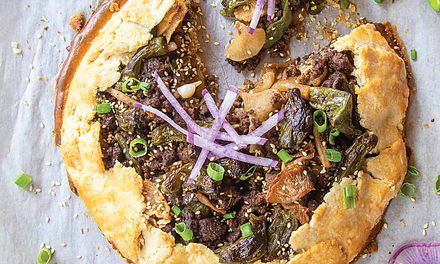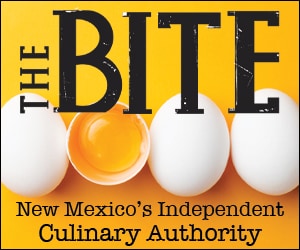As the Pandemic Surges, Restaurant Workers Face
Fears about the Virus and their Livelihoods
By Joanna Manganaro Toto

Donning masks and carrying handwritten signs, restaurant workers gathered around their employers to take photos that would later flood social media and be featured on local news broadcasts. Some held their young children in their arms. #LetUsServe, some signs demanded. Other signs highlighted the number of employees who were affected by Governor Michelle Lujan Grisham’s mandate to reenact the indoor dining ban in the state after a surge in COVID-19 cases. The protests occurred on the day the mandate went into effect, July 13. The same day, the New Mexico Restaurant Association (NMRA), along with several restaurants, filed a lawsuit against the governor, arguing that her order was “arbitrary and capricious” and suggesting that it amounted to discrimination against restaurants. A handful of restaurants defied the governor’s order and remained open, resulting in the loss of their food and beverage licenses. Other restaurant owners, irked by the NMRA’s stance, made a point of distancing themselves from the organization created to represent them. Some took to social media to express support of the governor’s decision, insisting that the health of their customers and employees was more important than their bottom line.
In a whiplash-inducing turn of events on July 20, an Eddy County judge sided with the NMRA and placed a restraining order on the governor’s mandate due to the failure of the governor’s office to respond to the lawsuit in time. Later that day, New Mexico’s Supreme Court quickly overturned the restraining order, leaving Governor Lujan Grisham’s mandate in place. Local news programs and newspapers featured restaurant owners worrying that shutting down indoor dining, after its brief comeback from June 1 to July 13, would be a death blow to their businesses. Other restaurant owners countered their claims, expressing optimism about their take-out and patio operations and confidence that their customers would continue to support them. In all the cacophony, the voices of the restaurant workers themselves went mostly unheard.
Like the United States as a whole, the state of New Mexico suffers from a deep political divide, which has been thrown into stark relief during the COVID-19 pandemic. It is not uncommon to see Santa Feans in the state’s progressive north wearing masks even while driving alone in their cars, while many residents of Carlsbad in the conservative southeast angrily protest mask-wearing, both online and in person.
As a group, restaurant workers in New Mexico are a microcosm of the political environment in the state, but what has connected them all during this singular time is an underlying sense of anxiety: anxiety about catching the virus due to facing the public day-in and day-out; anxiety about a patron becoming sick after visiting the restaurants where they work; anxiety about confrontations with patrons who lash out when asked to wear a mask; anxiety about the possibility of their employers going out of business; anxiety about pulling in fewer tips and being unable to support themselves and their families; and, for some, anxiety about the lack of a clear plan from management on how to deal with the new regulations.
Most of the restaurant workers I interviewed expressed admiration for how the owners and managers of their establishments were handling the changes associated with the pandemic. Some shared stories of owners bringing food to their employees and toys to their children during the weeks their restaurants were shut down. However, others dealt with practices by managers and owners that they found disturbing and unsafe. A server at a pub in Albuquerque’s Nob Hill neighborhood, who wished to remain anonymous, expressed dismay at the lack of clear communication and defined standards when it reopened for limited patio and dine-in service in June. They said, “We never had a meeting before we reopened where we got everybody together to go over everything, so one bartender did things differently than the next one.” The pub’s owner never shared the number of people that would constitute 50 percent capacity and never asked servers to count the number of people in the restaurant at any given time, so the server did not know if they were complying with the governor’s orders. A.J. Woods recalled an employee meeting on the reopening of the North Valley restaurant where he worked. He was shocked to hear the manager say that there would be no effort toward social distancing among restaurant employees and that the restaurant would not explicitly demand that customers wear masks in the establishment. Also present at that meeting was Alyssa Gaiser, who noted, “Something that really struck me was that the manager said, ‘If any of you don’t want to come back because you don’t feel safe, you will be terminated on the spot.’ That just really bothered me. Their reasoning was that they were taking all the precautions, so there should be no reason that we shouldn’t feel safe.”
Though Governor Lujan Grisham enacted a mandate requiring masks in public on May 13, the act of mask-wearing has become a flashpoint during this politicized pandemic. Many have refused to cover their faces in public, despite the governor’s order. This defiance has led to confrontations between restaurant workers and patrons. Describing some mask-free customers who have visited while she was working, Gaiser said, “It’s a political thing for them, so they feel very strongly and passionately about it. They’re fighting for something, so they’ll put up a fight. They’ll argue with you about it. It’s kind of crazy.” Dylan Taylor, a server at the Blue House Bakery & Café in Carlsbad, said, “Where we live, people have been a lot slower to take this seriously, and there are a lot of people who still don’t. At first, there were a lot of people not wearing masks and not taking social distancing seriously, so that was kind of stressful, but as things have played out, most people have been wearing masks and taking precautions.” Of mask requirements in restaurants, Fiona Brown, bartender at O’Niell’s Pub in Albuquerque, said, “It definitely does rub some people the wrong way. There’s a select few that get pissed about it, but what are you gonna do? This is the law.”

Photo by M Agency
In this hyper-political moment, the #LetUsServe protests initially came across as the frustrated response of conservative restaurant owners who would be furious about any move the governor made. With the federal supplement of $600 per week for the unemployed that was in place at the time, restaurant owners’ argument that their workers would be hurt by layoffs fell flat. According to the U.S. Bureau of Labor Statistics, the average annual income for restaurant workers in New Mexico is $22,060, which meant most laid-off workers would make more through unemployment benefits than they made while on the job, and they would not have to risk exposure to the coronavirus at work. Perhaps unsurprisingly, many workers did not support the #LetUsServe protests. Some restaurant workers instead circulated the hashtag #LetUsLive, highlighting the fact that because restaurant workers are ineligible for unemployment benefits if they quit their jobs without medical justification, they essentially must continue working regardless of their discomfort in facing the public during the pandemic. Brown expressed her frustration with the situation, stating, “If I quit, I would be unemployed but without the benefits because of quitting, so I have to come to work and do the best that I can.” One major asterisk to this situation is the case of undocumented restaurant workers, who are not eligible for unemployment benefits whether they are laid off or they quit. In their case, they are probably the first to be hurt when restaurants shut down and the last to leave if a restaurant is operating unsafely.
David Allen, assistant general manager at Guadalupe Mountain Brewing Co. in Carlsbad, which took part in the protests, offered a sympathetic perspective on #LetUsServe. He argued that it was not the workers who would be laid off who would be hurt the worst, but rather the tipped workers in restaurants that pivoted back to takeout, delivery, and patio service. Allen said, “These servers live off of tips, and even 50 percent capacity hurts them, so when you take away indoor dining, you take away a big chunk of their paycheck.” In order to supplement lost tip income after switching back to patio service and takeout, Guadalupe Mountain Brewing’s owner gave servers a temporary raise to their hourly wage. Virginia Hilliard, server at Santa Fe’s Arroyo Vino, also called attention to the plight of servers whose restaurants pivot to takeout, saying, “I don’t think people understand that we make $3 an hour and that we rely on tips, even when we’re just doing takeout service.” On several occasions, she has had to gently mention that fact to customers, who are often surprised to hear it.
New Mexico’s tipped employee minimum wage is $2.35 per hour, just $0.22 above the federal limit and one of the lowest in the country. Albuquerque, Las Cruces, and Santa Fe County have enacted increases on that wage, but even the highest, in Albuquerque, is just $5.60 per hour. This leaves employees’ income largely in the hands of customers, which can be a benefit in some cases and a liability in others. Hilliard explained, “Generally speaking, people are tipping on average 20 percent [during the pandemic], but occasionally there are people who tip $100 on every order. But then there are regular customers who consistently tip $5 on their orders,” which is low for a fine-dining restaurant like Arroyo Vino, whose ticket prices are relatively high. The NMRA does not support major increases in the tipped minimum wage, and it has actively opposed efforts to require restaurants to offer employees paid sick leave.

Photo by DisobeyArt
In order to ease the uncertainty for servers, some New Mexico restaurants, including Vinaigrette and Bosque Brewing, have recently done away with tipping and switched servers to a higher hourly wage meant to provide a livable income. Each of the restaurant workers I interviewed expressed ambivalence about moving away from a tipping system, but overall it was a concept that appealed to them. The most solid stance on the issue came from Brown, the O’Niell’s bartender, who asserted, “Industry workers should be paid a living wage and shouldn’t have to rely on tips.”
The issue that most united the servers interviewed was the concern for their health and that of their customers. Sarah Donoghue, a server at Gecko’s Bar & Tapas in Albuquerque, noted that her asthma and other preexisting conditions put her at a higher risk for COVID-19, which causes her anxiety about her line of work. She said, “My emotions have been all over the place. Whenever I go in to work, I say a prayer and ask God to protect me and my customers.” Having recently recovered from cancer, Taylor in Carlsbad was most worried when the virus first emerged, but his fears have subsided somewhat over time. He said, “In the beginning, there were a lot of unknowns, and I was pretty stressed out about it.” Other workers have felt their anxiety build rather than decrease. Brown said, “With the rise in COVID cases that we’re having in New Mexico now, it’s a lot more scary. Yes, we want to work; we want to be there, but we don’t want to put ourselves and our families at risk.”
For Woods, health and safety concerns caused him to decline to return to work—a decision he supported with medical documentation in accordance with New Mexico Workforce Solutions’ Return to Work guidelines. Despite following the protocols, he has been embroiled in a protracted struggle to receive unemployment. Woods explained, “For me personally, seven dollars per hour isn’t worth it to risk COVID-19 in a restaurant. I’ve made the decision that it’s just not something I’m going to risk, especially now since things are so slow and there’s no tips.” He added, “Restaurant employees are some of the lowest-paid and lowest-respected people in the economy, so what warrants them risking their lives for other people’s convenience?”
The restaurant workers who have remained on the job note that customers’ actions play an important role in how they feel at work and how well they are able to do their jobs. Alyssa Montoya, counterperson at BoulTawn’s Bagelry, Café & Gallery in Santa Fe and a delivery driver for DoorDash, offered this suggestion to people planning to patronize restaurants: “Wear your mask, follow the rules. Just because we know you personally doesn’t mean the rules don’t apply to you. Also, be aware of your personal items. As much as you might want to put your purse on the counter to get your credit card, please don’t.” Donoghue said, “Be respectful. Don’t linger. Don’t spend three hours on the patio when we’re at 50 percent capacity.”
Gaiser put it succinctly: “Tip well and be kind.”
Edible celebrates New Mexico's food culture, season by season. We believe that knowing where our food comes from is a powerful thing. With our high-quality, aesthetically pleasing and informative publication, we inspire readers to support and celebrate the growers, producers, chefs, beverage and food artisans, and other food professionals in our community.












